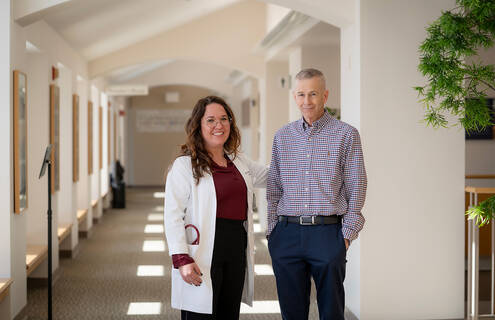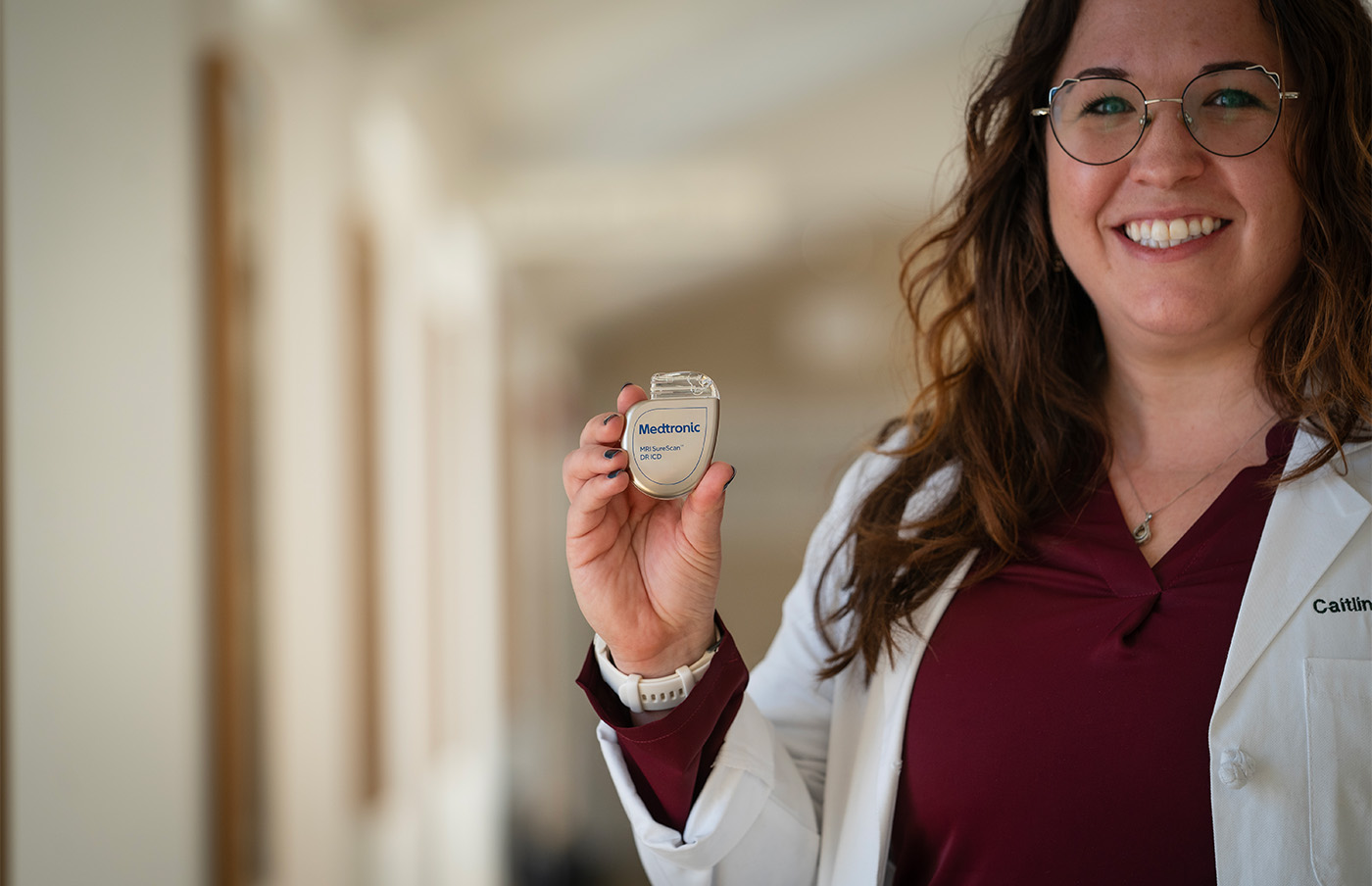
Stephen Pratte is grateful.
After his disabled adult son Mario went into cardiac arrest, Caitlin Booze, MSP, APRN, FNP-BC stepped in.
Booze is a cardiology nurse practitioner specializing in electrophysiology (EP) at Dartmouth Hitchcock Clinics Manchester.
When she met his son, Booze was already monitoring Pratte’s pacemaker. Pratte knew the value that he and her team brought to making sure a patient’s device was helping to keep the heart functioning well.
What surprised and most impressed Pratte, however, was the way she showed up for his adopted, physically and mentally disabled adult son who has often been ignored and talked over in other healthcare settings.
“The big part was after he was found unresponsive in a hallway at his day program. He was out for almost 10 minutes. We didn't think he was gonna wake up. It turned out that he had a 90 percent blockage on one side of his heart and 75 on the other. He was in the ICU. Caitlin came in. She was just understandable. She went and sat with him for quite a while. He's mentally about five to eight years old, so that was important to me,” Pratte says.
Pratte’s gratitude increased after Mario got a defibrillator and he went to see Booze as her patient.
“When he walked in to see her, I don't think I've ever seen him so happy. And it was just like having family care. And then, after the summer, she called again and asked how he was doing. Nobody's done that for forever,” he says.
What Booze does
As a cardiology nurse practitioner specializing in electrophysiology (EP) and cardiac device management, Booze tracks data from heart devices in real-time, as part of the Dartmouth Health Cardiac Device Clinic.

The monitoring means she can detect potential health issues, adjust care and treatment plans, and support a patient’s own health management.
The specifics of her job can sound clinical, so when you ask her what she does, Booze likes to describe her job in terms that patients understand.
She says she is like an electrician for a person’s heart. The heart has chambers like rooms with walls and valves, arteries and veins that act as plumbing, and a form of electricity responsible for the rhythm management of the heart. She explains that the electrical part—or the EP—is what she watches.
As she speaks, her passion for her work is palpable. Her interest in caring for patients with heart device monitors first began when she was younger and her mother worked as an EP nurse. She says now she is second-generation in the field.
Booze is a patient advocate first, ensuring her patients feel heard, understood and supported. Her department’s approach—working and collaborating with physicians, physician assistants, and nurse practitioners—means patients get the right help at the right time.
“My work allows me, even if a quick phone call, to always provide the best evidence-based practice care I can,” she says.
How she works
Booze works primarily with four types of treatment devices, tailoring them to meet her patient’s needs. These are:
- Loop monitoring for heart rhythm
- Pacemakers for slow heart rhythms
- Defibrillators for fast non-life sustaining heart rhythms
- Cardiac resynchronization therapy devices that help the heart pump when the bottom chambers are out of sync.
Caitlin's typical day involves checking a secure website for critical information and processing reports; doing annual or biannual device checks, depending on their preference or need; and responding to alerts that go directly to Caitlin's team, which then coordinates with a larger primary cardiology team for necessary adjustments or actions.
“Adjustments can be as simple as changing the alert settings to catch a heart rhythm that is causing patient symptoms on a loop monitor or turning on an algorithm in a pacemaker to allow the patient’s heart rate to increase with exercise,” she says.
“More complex is reprogramming tachy therapies in a defibrillator and having the heart beat properly with cardiac resynchronization devices,” she adds.
The benefits are well-documented
Both Pratte and his son have their own readable monitor that Booze reads. At any time of the day, they can check how their hearts are functioning. They can reassure themselves that everything is alright or reach out if they have concerns, though Pratte says they usually get a call from her team before.
My work allows me, even if a quick phone call, to always provide the best evidence-based practice care I can.
Caitlin Booze, MSP, APRN, FNP-BC
There are other benefits, too. In addition to helping patients feel more connected to their own health management, studies show that remote patient monitoring can improve mortality rates, reduce healthcare visits, increase patient follow-up and retention, and provide earlier detection of issues that can then be acted on.
What her patients say
As far as Pratte and his son are concerned, Pratte says the biggest plus is the consistent, informed and supportive care Booze and her team provide.
Because of the high level of care that they get, he and his son will never go anywhere else.
“I would not change Dartmouth Health for anything at this point. It's reassuring that you have people that you can trust and feel good about and that you're not being poo-pooed. They will answer your questions and they will ask you questions. And it's just nice to know, they will take the time to sit with you and talk with you and they don't rush you on the appointments,” he says
As for Booze, she points out that her role also gives her the opportunity to always strive to learn more.
“When you are in healthcare, having a passion for what you're focusing on is very important.” Feeding her passion does not end or is not limited to her Manchester clinic or the team at Dartmouth Hitchcock Medical Center in Lebanon.
“I am also part of the Heart Rhythm Society, which is the national organization for electrophysiology and a leadership program in it called Leap. I am actually chairing a panel at a meeting coming up. The society allows me to have access to the newest evidence. I have connections to practitioners, PAs, and physicians all over the country.”
Resources like these mean when Booze has a particularly challenging case, she can learn from her colleagues, her team, and a larger network of people in her field, getting her patients the best care and treatment she can.